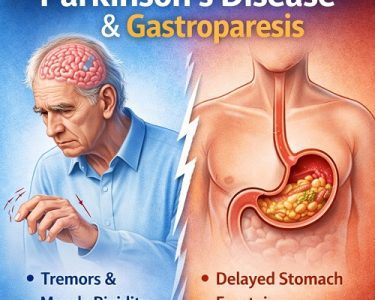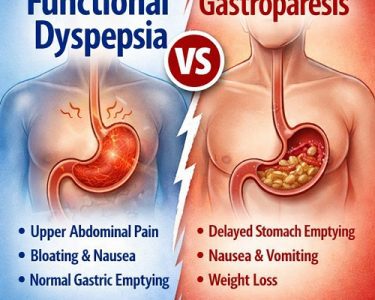Gastroparesis is one of the most misunderstood and challenging digestive disorders, yet its impact on everyday life can be profound. Individuals living with this condition often face unpredictable and distressing symptoms such as chronic nausea, persistent bloating, early satiety, vomiting, and abdominal pain—symptoms that can disrupt eating patterns, weaken nutritional status, and severely affect quality of life. These symptoms often appear without a clear explanation, leaving many patients wondering what is truly happening inside their digestive system and how conditions like what is diabetic gastroparesis symptoms, causes and treatment relate to their own experience.
As medical research continues to evolve, a growing area of interest is the role of emotional and psychological factors in digestive health. This leads to an important and increasingly asked question: can stress cause gastroparesis or contribute to delayed stomach emptying? Since the gut and brain are deeply connected, understanding how stress and anxiety influence stomach function is crucial for anyone dealing with gastroparesis symptoms. Before diving into this complex relationship, it is essential to explore the condition itself—what gastroparesis is, why it develops, and how it affects the body’s ability to digest food properly.
Understanding Gastroparesis: A Detailed Overview
Gastroparesis is a chronic digestive disorder in which the stomach muscles do not function normally. Instead of contracting efficiently to move food into the small intestine, the stomach becomes sluggish—leading to delayed gastric emptying. Importantly, this occurs without any physical blockage, meaning the stomach is slow, not obstructed.
How the Stomach Normally Works
In a healthy digestive system:
- The stomach muscles contract rhythmically
- Food is broken down and pushed forward
- Nerves, especially the vagus nerve, regulate stomach movement
- Hormones guide the timing of digestion
However, when the nerves or muscles become damaged or impaired, motility slows drastically. This is where gastroparesis develops.
Primary Causes of Gastroparesis
Understanding the root causes of gastroparesis is essential before we evaluate whether gastroparesis and stress are meaningfully connected. Some of the most common causes include:
Diabetes
Diabetes—especially uncontrolled blood sugar—remains the leading cause. High glucose damages the vagus nerve, weakening stomach muscle coordination.
Viral Infections
Some individuals develop gastroparesis after severe viral illnesses, which may temporarily or permanently affect stomach nerves.
Autoimmune Conditions
Autoimmune reactions can mistakenly attack the nerves controlling stomach movement.
Surgery-Related Nerve Injury
Procedures involving the stomach or esophagus may accidentally harm nerves essential for digestion.
Idiopathic Gastroparesis
In many cases, no identifiable cause is found, making stress and emotional health increasingly important areas of study. As awareness grows, many patients look up resources such as the ultimate guide to weight gain and gastroparesis, demonstrating how symptoms affect not just digestion but the entire lifestyle.
Symptoms of Gastroparesis: What Patients Experience
Gastroparesis symptoms range from mild to debilitating. While every person’s journey is unique, the most common symptoms include:
- Chronic nausea
- Vomiting undigested food
- Feeling full quickly
- Stomach bloating
- Upper abdominal discomfort
- Unexpected weight changes
- Heartburn or reflux
Some individuals even explore additional support through themes like gastroparesis home remedies tips, showing the constant search for comfort. These symptoms may remain steady, fluctuate, or occur in flare-ups. And this is exactly where emotional triggers—especially stress—enter the picture.
Can Stress Cause Gastroparesis? The Evidence Explained
Now we return to the central question: can stress cause gastroparesis or worsen the condition? While stress may not directly cause permanent nerve damage the way diabetes or surgery can, research shows that emotional stress significantly affects stomach motility, sometimes dramatically. Here is what science reveals:
Stress Slows Digestion
The body enters “fight or flight” mode during stress. In this state:
- Blood flow is redirected away from digestion
- Stomach contractions slow down
- Gastric emptying becomes delayed
This natural response can mimic or intensify gastroparesis symptoms.
Stress Disrupts the Gut-Brain Axis
The gut and brain communicate constantly. When stress levels rise:
- Nerve signaling becomes irregular
- Muscle coordination in the stomach weakens
- Hormones influencing digestion shift
This is why many patients report worsening symptoms during emotional distress.
Stress Triggers Muscle Tension in the GI Tract
Anxiety can tighten smooth muscles throughout the gastrointestinal system, further slowing gastric emptying and amplifying discomfort.
Can Gastroparesis Be Caused by Stress? What Experts Say
Many people ask whether can gastroparesis be caused by stress alone. While stress is unlikely to be the sole cause of chronic gastroparesis, experts agree that:
- Stress can contribute to functional delays
- Stress can trigger initial symptoms in those predisposed
- Stress can worsen existing gastroparesis significantly
Patients with idiopathic gastroparesis often report their symptoms began during an extremely stressful period in life. Although stress does not create neurological damage, it can create functional motility problems that resemble true gastroparesis.
Gastroparesis and Stress: A Two-Way Relationship
Not only can stress make gastroparesis worse, but gastroparesis itself can increase stress. This creates a cycle:
- Stress slows digestion
- Symptoms worsen
- Anxiety increases
- Digestive motility decreases again
This constant loop leads to emotional strain, food fears, social withdrawal, and physical discomfort. It is no surprise that many patients search for information on gastroparesis stress, hoping to understand why emotional triggers seem so powerful.
Can Stress Cause a Gastroparesis Flare Up? Absolutely
One of the most frequently asked questions is: can stress cause a gastroparesis flare up even if the person already has the condition?
Yes—stress is one of the strongest flare-up triggers, alongside poor diet choices, dehydration, infections, or hormonal changes. During stressful periods, patients often experience:
- Severe nausea
- Vomiting episodes
- Painful bloating
- Dramatic loss of appetite
- Heightened stomach pressure
- Increased fatigue
These flare-ups may last hours, days, or even weeks depending on stress levels and overall digestive health.
Can Gastroparesis Be Caused by Anxiety? Research Reveals a Link
A related question many people ask is whether can gastroparesis be caused by anxiety. Anxiety is closely tied to digestive dysfunction. Studies show:
- Anxiety changes stomach nerve signaling
- It alters hormone levels that regulate gut movement
- It increases sensitivity to stomach discomfort
- It disrupts the gut microbiome
- It heightens the perception of nausea and fullness
While anxiety does not permanently damage the vagus nerve, it can create significant motility delay—leading some individuals to experience symptoms that feel identical to gastroparesis.
This is one reason why many patients eventually search for resources like gastroparesis symptoms, causes, diet and treatment, hoping to understand every angle of their condition.
How Stress Impacts Long-Term Digestive Health
When stress becomes chronic, the effects on the stomach deepen. Chronic stress can:
- Reduce stomach emptying speed for long periods
- Increase inflammation in the digestive system
- Reduce digestive hormone production
- Increase sensitivity to pain and discomfort
- Disrupt the brain’s ability to regulate gut function
Over time, this may worsen pre-existing gastroparesis or lead to persistent functional symptoms resembling the disorder.
The Hidden Psychological Burden of Gastroparesis
Gastroparesis is far more than a physical condition—it carries emotional weight. People often struggle with:
- Fear of eating
- Social isolation
- Depression
- Ongoing anxiety
- Reduced quality of life
- Fear of sudden flare-ups
This emotional burden can itself trigger more digestive symptoms, creating a cycle that feels impossible to break.
Why Understanding the Stress–Gastroparesis Connection Matters
Millions of individuals suffer in silence, believing their symptoms are random or purely physical. Recognizing the role of stress can:
- Improve symptom management
- Reduce flare-ups
- Improve mental well-being
- Help patients feel empowered rather than confused
- Provide clarity during unpredictable symptom shifts
Toward the end of research, many individuals also explore natural supplements for gastroparesis, combining lifestyle changes and holistic approaches with traditional care to find balance.
Final Thoughts
So, can stress cause gastroparesis? While stress alone does not typically create permanent nerve damage, it absolutely can cause significant motility problems, worsen existing gastroparesis, and trigger powerful flare-ups. Understanding the deep connection between emotional health and digestive function is key to managing symptoms more effectively.
By learning how stress influences digestion, patients gain the power to recognize triggers, reduce flare-ups, and regain quality of life. Gastroparesis is a complex disorder—but knowledge is the first step toward relief.




